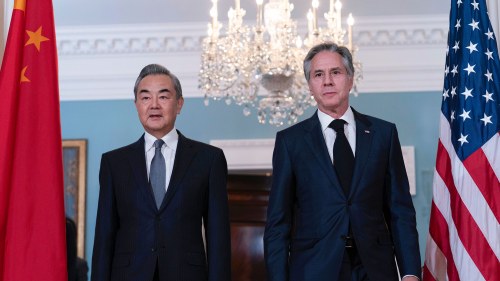Foreign Policy Matters: Talking with Rivals

Americans Favor US Leaders Opening Talks with Most Adversaries
As conflicts continue to unfold across the globe, Washington officials have a variety of tools they can use to shape the US response. One path that’s popular with the public: meeting with other world leaders—even those representing US adversaries.
In Council polling conducted this September, a majority of Americans supported opening diplomatic talks with China (83%), Russia (69%), and North Korea (66%), despite holding widely negative views of each country. The public also largely backed meeting with the leaders of Iran (72%) and Hamas (57%), though opinions have likely shifted dramatically in the wake of Hamas’ recent attack on Israel.
What else is in the foreign policy toolbox? Senior Fellow Elizabeth Shackelford draws on her experience as a US diplomat to explain in a new Council video.
The Data Dimension
Public support for holding diplomatic talks with the United States’ chief geopolitical rivals, China and Russia, is bipartisan. Council polling finds 79% of Republicans and 87 percent of Democrats favor meeting with Chinese leaders and 72 percent of Republicans and 65 percent of Democrats support meeting with Russian leaders.
What We're Watching
- Biden’s purse problem: “War financing for a major power isn’t just about accounting and the bottom line. It’s also—even mostly—about politics,” writes Nonresident Fellow Paul Poast. He explains how that could impact US aid to Ukraine in World Politics Review.
- Global AI guidelines: Seven in 10 Americans say the United States should participate in a treaty that limits the development of artificial intelligence and its uses for military purposes, Council polling finds.
- An Asian NATO: Could the Quad become a new NATO for the Indo-Pacific? United States Studies Centre’s Michael Green and the Council’s Karl Friedhoff discuss the implications of a multilateral defense pact in the region.
- The next generation of changemakers: Join the Council on Dec. 6 for an inspiring evening with rising leaders who are sparking real change, making history, and creating lasting global impact.
Ask an Expert
Why should US officials pay attention where the public stands on key issues? 
“It's important to look at public opinion because it keeps our policymakers accountable. [... ] Foreign policy usually is not something that American people focus on very much themselves. They have other things to worry about on a day-to-day basis. So, they sort of outsource the decisions and have confidence in political leaders. This is some way to gauge whether the public and the leaders’ decisions are in sync.”
—Senior Fellow Dina Smeltz on the Council’s Deep Dish podcast

